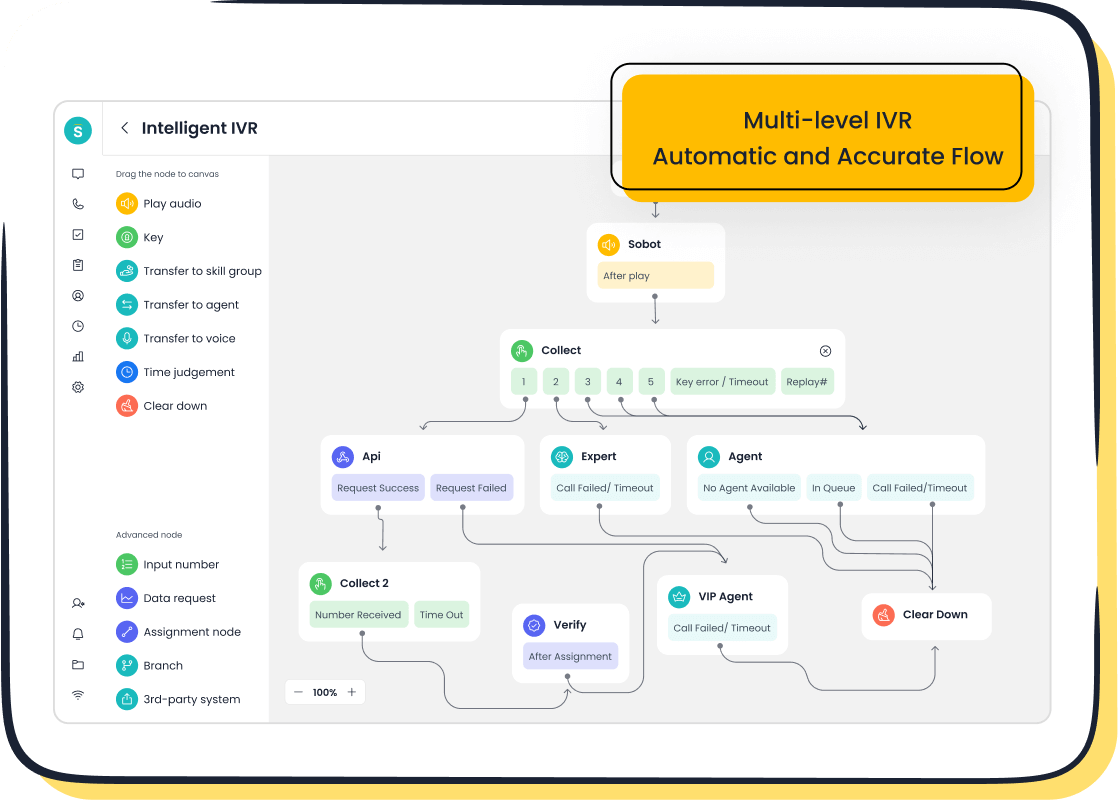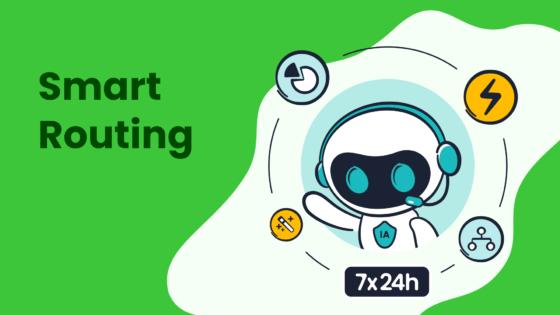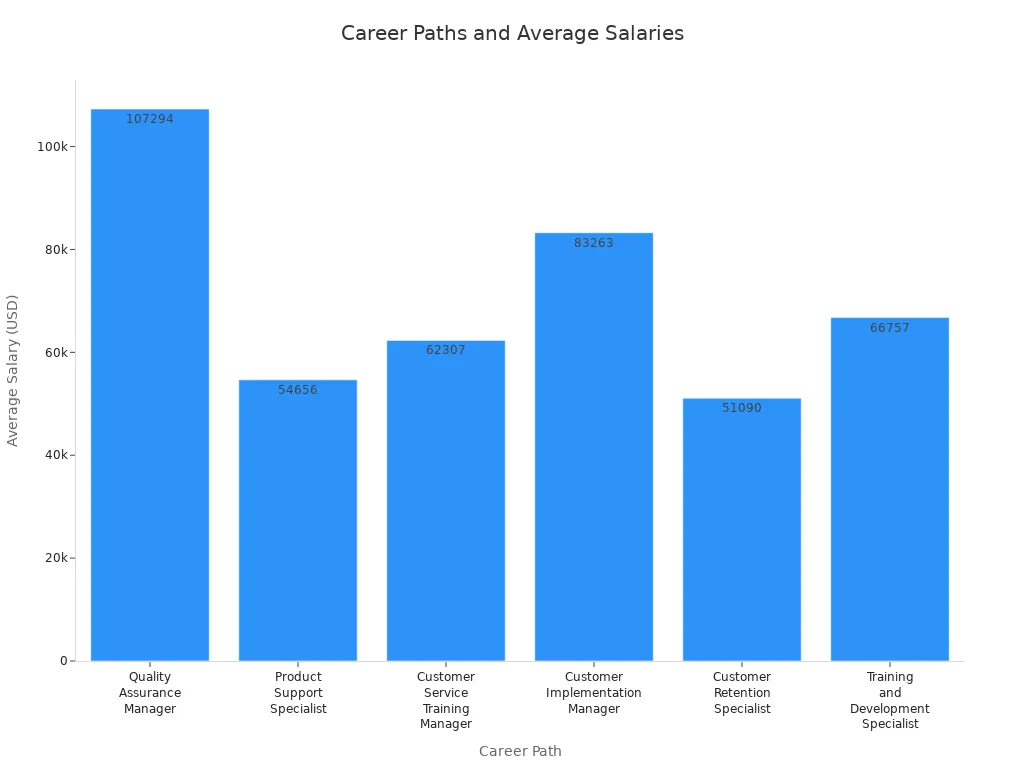Enterprise Customer Service Rep Qualifications Explained

Enterprise customer service rep roles demand a unique mix of qualifications and skills. Companies expect candidates to show high computer proficiency, strong communication, and the ability to build rapport with customers. Common requirements include a high school diploma or GED, at least two years of customer service experience, and a commitment to professionalism. Employers also value multitasking and prioritization skills, a positive demeanor, and flexibility for evening or weekend shifts. Sobot call center technology and Sobot AI help customer service professionals handle fast-paced environments and diverse customer needs. Readers can reflect on their own customer service skills and experience as they explore what sets a customer service representative apart.
Role of an Enterprise Customer Service Rep

Key Responsibilities
An enterprise customer service rep handles a wide range of customer inquiries across multiple channels, including phone calls, email, chat, and social media. The job description often includes managing large volumes of customer interactions, resolving issues, and ensuring customer satisfaction. In large organizations, the job description becomes more specialized, with agents focusing on specific tasks such as technical support, billing, or product information. The responsibilities also include documenting customer interactions, escalating complex cases, and following up to ensure resolution.
The following table highlights how the job description and responsibilities differ by business size:
| Business Size | Team Size | Organizational Structure & Hierarchy | Responsibilities & Specialization |
|---|---|---|---|
| Small | 10-20 people | Agents report to a lead manager; fewer layers; generalists handle many tasks | Broad responsibilities; agents are well-rounded generalists |
| Mid-sized | 20-100 people | Specialized field teams; hierarchy includes supervisors, managers, directors | More specialized roles focused on specific departments or functions |
| Enterprise (Large) | 100-300 people | Complex multi-layered hierarchy; siloed teams | Highly segmented roles; focus on efficiency, automation, and career paths |
Enterprise customer service reps use advanced tools like Sobot’s omnichannel solution to manage customer inquiries efficiently. Sobot’s unified workspace allows agents to view customer data and handle calls, chats, and emails in one place, improving workflow and reducing average resolution time. The job description also includes using AI-powered features to automate repetitive tasks and prioritize urgent customer needs.
Importance in Customer Service
Enterprise customer service reps play a critical role in shaping the customer experience. Their job description centers on being the frontline contact for customers, addressing inquiries, and resolving complaints. They help companies achieve business objectives by improving workflows, relaying feedback, and collaborating with other departments. Customer service professionals maintain up-to-date product knowledge and identify opportunities for upselling, which supports revenue growth.
Effective customer service representatives directly impact customer satisfaction scores. By collecting real-time feedback and acting quickly, they prevent negative experiences and reduce customer churn. The job description often includes using performance indicators such as Average Handling Time (AHT), First Call Resolution (FCR), and Customer Satisfaction (CSAT) to measure success. Sobot’s omnichannel platform supports these metrics by unifying customer data and enabling agents to deliver personalized service.
Tip: High-performing organizations invest in technology like Sobot’s AI-driven solutions to boost efficiency. Over 90% of companies using AI report time and cost savings, allowing customer service professionals to focus on complex customer needs and drive business growth (source).
Enterprise customer service reps ensure that every customer receives prompt, professional, and respectful treatment. Their job description supports the company’s reputation and helps retain loyal customers.
Required Skills and Qualifications
Education and Experience
Employers set clear standards for customer service qualifications in enterprise environments. Most job postings require a high school diploma or GED. Some positions accept community college students or high school students with a work permit. These educational requirements ensure candidates have basic literacy and numeracy skills for the job.
Unordered list of common educational qualifications:
- High School Diploma or GED
- Community College Student status
- High School Student status (with work permit)
Experience plays a major role in hiring decisions. Companies often look for at least two years of customer service experience. This background helps candidates handle complex customer interactions and adapt to fast-paced environments. Previous experience in retail, hospitality, or call centers gives candidates an edge. Employers value candidates who have demonstrated strong communication skills and the ability to resolve customer issues efficiently.
On-the-job training and certifications add value to a candidate’s profile. Many organizations offer training programs to help new hires learn company policies, product details, and customer service skills. Certifications in customer service, such as those from the International Customer Service Association, show commitment to professional growth. These credentials can help candidates stand out during the hiring process.
Note: Employers use a multi-step hiring process to evaluate candidates. Initial interviews assess mindset and skills. Video questionnaires test communication and personality. Deep-dive interviews explore career history and problem-solving abilities. Reference checks confirm strengths and work style. This thorough approach ensures the right fit for the job.
Technical Skills
Enterprise customer service representatives must master a range of technical skills. Proficiency with customer relationship management (CRM) systems is essential. These tools help agents track customer interactions, manage data, and resolve issues quickly. Product knowledge mastery allows agents to answer questions accurately and build trust with customers.
The following table highlights the most in-demand technical skills for customer service representatives in 2024:
| Technical Skill | Explanation and Importance | Examples / Tools / Notes |
|---|---|---|
| CRM Systems Proficiency | Manage customer data, track interactions, and provide timely resolutions. AI integration enhances automation and insights. | Sobot Voice/Call Center, Salesforce, HubSpot |
| Product Knowledge Mastery | Respond quickly and accurately to customer inquiries, reducing handling time and building trust. | Regular training, Sobot unified workspace |
| Data Analysis and Reporting Skills | Identify trends, optimize workflows, and personalize interactions by analyzing feedback and service metrics. | CSAT, Average Handle Time, First Contact Resolution, Sobot analytics |
| Multitasking and Time Management | Handle multiple communication channels efficiently and ensure timely responses. | Sobot omnichannel solution, task management tools |
| Communication with AI Tools | Use AI chatbots, virtual assistants, and automated ticketing to improve efficiency and accuracy. | Sobot AI-powered Voicebot, automated ticketing |
| Troubleshooting and Problem-Solving | Diagnose and resolve customer issues to improve satisfaction and loyalty. | Sobot diagnostic dashboards, step-by-step guidance |
| Knowledge of Compliance and Regulations | Understand legal requirements for handling sensitive information, especially in regulated industries. | Finance, healthcare, telecommunications sectors |
Agents must use technology to deliver seamless customer service across channels. Sobot Voice/Call Center provides a unified workspace for managing calls, messages, and customer data. Its intelligent IVR system routes calls efficiently, while AI-powered voicebots recognize customer intent and automate routine tasks. These features help agents reduce average handle time and increase first-contact resolution rates. Sobot’s omnichannel solution integrates voice, chat, email, and social media, allowing agents to multitask and manage customer interactions from one platform (Sobot Omnichannel Solution).
Continuous learning is vital for technical skills. Customer service representatives must stay updated on new tools and features. Regular training sessions and access to product updates ensure agents maintain expertise. Companies encourage agents to pursue certifications in customer service technology, which demonstrates proficiency and commitment to excellence.
Tip: Technical skills directly impact customer satisfaction. Agents who master CRM systems, AI tools, and analytics deliver faster, more accurate service. This leads to higher customer retention and loyalty.
Soft Skills
Soft skills form the foundation of effective customer service. Empathy, patience, and strong communication skills help agents build rapport with customers. These skills reduce misunderstandings and foster trust. Research shows that companies with high organizational trust and leadership empathy report 50% better retention rates and 75% higher engagement. Empathetic agents create memorable experiences that encourage customer loyalty.
Unordered list of essential soft skills:
- Empathy
- Active listening
- Patience
- Adaptability
- Conflict resolution
- Relationship building
- Time management
- Multitasking
- Resilience under pressure
Agents must communicate clearly and professionally. They listen to customer concerns, ask clarifying questions, and provide step-by-step solutions. Strong communication skills help agents de-escalate frustration and resolve issues quickly. Employers evaluate these skills through situational interview questions and role-play scenarios.
Problem-solving is another critical skill. Agents diagnose issues, identify root causes, and guide customers through solutions. This skill requires critical thinking and transparent communication. For example, when AI-powered systems misinterpret commands, agents must step in to resolve technical problems and maintain customer trust.
Soft skills also support employee retention. Skilled agents reduce attrition rates, leading to more consistent and high-quality service. Training programs that nurture empathy and communication result in measurable gains in customer satisfaction and employee engagement.
Callout: Soft skills are not just “nice to have”—they are essential for customer service excellence. Investing in empathy and communication training pays off in higher retention and better business outcomes (source).
Employers look for candidates who demonstrate adaptability and resilience. Agents must adjust to changes in technology, customer expectations, and company policies. They handle multiple tasks simultaneously and remain calm under pressure. These qualities ensure agents deliver reliable customer service even in challenging situations.
Customer service representatives face common challenges such as handling angry customers, transferring calls, and managing high expectations. Agents address these issues by staying calm, preparing customer information before transfers, and setting realistic expectations. Sobot’s unified workspace and AI-powered tools help agents manage these challenges efficiently, ensuring a positive customer experience.
Advanced Qualifications for Customer Service Representatives
Certifications
Certifications give customer service representatives a clear advantage in enterprise environments. Employers value credentials that prove advanced skills in communication, problem-solving, and leadership. Popular certifications include the Certified Customer Service Professional (CCSP), which sets a gold standard for customer interaction and career advancement. The HDI Customer Service Representative (HDI-CSR) certification demonstrates expertise in issue resolution and high-quality service delivery. Leadership-focused certifications, such as the Customer Service Leadership Certification, help professionals move into management roles. Specialized programs, like ICMI’s Artificial Intelligence in the Contact Center, prepare agents for AI integration, which is increasingly important as companies adopt new technologies.
| Certification Name | Focus Area / Skills Covered | Employer Value / Notes |
|---|---|---|
| Certified Customer Service Professional (CCSP) | Customer interaction, problem-solving, communication skills | Recognized as gold standard; helps career advancement to supervisory/manager roles; requires 2+ years experience and exam |
| Customer Service Leadership Certification | Leadership skills, strategic thinking, team management | Ideal for aspiring managers/directors; boosts team performance and customer satisfaction |
| HDI Customer Service Representative (HDI-CSR) | Hard skills for support roles, issue resolution | Suitable for customer-facing roles; proves ability to deliver high-quality service; good for career advancement |
| ICMI's Artificial Intelligence in the Contact Center | AI concepts, automation, aligning AI with customer experience | Prepares professionals for AI integration; increasingly essential as AI adoption grows in customer service |
| Certified Client Service Specialist (CCSS) | Core customer service principles, conflict resolution, sales | Suitable for reps, inside sales, supervisors; no prior experience needed; focuses on responsive service and conflict management |
Continuous learning remains essential. Many companies, including TTEC, promote certified employees and offer tuition reimbursement for ongoing education. Sobot encourages agents to pursue certifications that align with preferred skills and qualifications, especially those focused on AI and omnichannel support.
Multilingual Abilities
Multilingual abilities stand out among advanced qualifications for enterprise customer service representatives. Agents who speak multiple languages help companies reach global markets and serve diverse customers. Multilingual support increases customer satisfaction, loyalty, and trust. Research shows that 61% of customers feel more satisfied when they communicate in their native language (source). Intelligent routing and AI-powered translation tools, like those found in Sobot’s omnichannel solution, allow agents to handle inquiries in many languages efficiently. Sobot’s platform supports multilingual templates and time zone settings, which help agents deliver personalized service and reduce resolution times.
Providing support in customers’ preferred languages removes barriers and creates a more inclusive experience. Brands offering multilingual support see higher referral rates and lower churn. Nearly 70% of customers would switch brands for service in their native language. Sobot’s technology enables scalable, cost-effective multilingual support, giving companies a competitive edge.
Industry Experience
Industry experience enhances a representative’s qualifications and skills. Agents with backgrounds in retail, finance, gaming, or education understand unique customer needs and industry regulations. Experience in regulated sectors, such as healthcare or financial services, prepares agents to handle sensitive information and comply with legal requirements. Sobot’s solutions serve a wide range of industries, including retail, financial services, and gaming, allowing agents to gain valuable experience with different customer profiles and workflows.
Employers look for candidates who combine preferred skills and qualifications with industry-specific knowledge. This combination helps agents deliver tailored solutions and build stronger relationships with customers. Industry experience, paired with certifications and multilingual abilities, positions customer service representatives for career growth and leadership opportunities.
Tools and Technology in Enterprise Customer Service

Sobot Voice/Call Center

Advanced technology shapes the modern customer service landscape. Sobot Voice/Call Center stands out as a powerful tool for enterprise customer service teams. This platform uses AI-powered voice agents that handle customer inquiries with real-time speech recognition and multilingual support. These AI agents resolve over half of customer interactions independently, which reduces repetitive tasks for human agents. As a result, customer service teams can focus on complex customer needs and improve first-call resolution rates.
The Weee! customer story highlights these benefits. Weee!, a leading online supermarket, faced challenges with inflexible systems and language barriers. After adopting Sobot Voice/Call Center, Weee! saw a 20% increase in agent efficiency and a 50% reduction in resolution time. Customer satisfaction scores reached 96%, showing how technology can transform customer service operations. Sobot’s intelligent voicebot guides customers through solutions, supports 24/7 service, and ensures every customer receives prompt attention.
Sobot’s AI-driven solutions boost operational efficiency and help customer service teams deliver high-quality support at scale.
Omnichannel Solutions
Omnichannel solutions play a key role in enterprise customer service. Sobot’s omnichannel platform unifies customer interactions across voice, chat, email, and social media. This integration allows agents to manage all customer conversations in one workspace, which increases productivity and reduces response times. Businesses with strong omnichannel strategies retain 89% of customers, compared to only 33% for those with weak strategies (Aberdeen Group).
Sobot’s omnichannel solution provides valuable data-driven insights, helping customer service teams optimize their workflows and improve customer satisfaction. The platform reduces agent workload by 60% and increases conversion rates by 15%. Companies like OPPO and J&T Express have achieved high customer satisfaction scores and improved operational efficiency using Sobot’s technology.
Omnichannel platforms enhance customer loyalty, support consistent service, and help businesses track key metrics like first-contact resolution and customer satisfaction.
Career Growth and Opportunities
Advancement Paths
Enterprise customer service jobs offer clear advancement paths for motivated professionals. Large organizations encourage employees to explore new areas and develop their skills through mentorship, collaboration, and project-based assignments. Managers help team members find opportunities that match their interests and strengths. Many customer service representatives move into specialized or leadership roles after gaining experience. Common career paths include quality assurance manager, product support specialist, training manager, and customer retention specialist. These positions require strong communication, analytical, and leadership skills. Employees who show initiative and master new technologies, such as Sobot’s omnichannel solutions, often progress faster in their careers.
| Career Path | Typical Qualifications | Key Responsibilities | Average Salary (USD) |
|---|---|---|---|
| Quality Assurance Manager | Bachelor's degree, customer service management experience, analytical skills | Establish QA standards, evaluate agent performance, lead training and calibration | $107,294 |
| Product Support Specialist | Bachelor's degree, technical certification, product support experience | Troubleshoot product issues, educate customers, support agents | $54,656 |
| Customer Service Training Manager | Bachelor's degree, 5+ years experience, training program expertise | Develop and maintain training programs, measure training success | $62,307 |
| Customer Implementation Manager | Bachelor's degree, project management skills | Manage customer onboarding and implementation, align teams, provide training | $83,263 |
| Customer Retention Specialist | High school diploma, communication skills, customer service or sales experience | Proactively engage customers, monitor usage, negotiate contracts | $51,090 |
| Training and Development Specialist | Bachelor's degree, training methodologies knowledge, HR or training experience | Design and deliver training, assess skill gaps, ensure compliance | $66,757 |

Salary Expectations
Customer service jobs in the United States offer competitive pay, especially for those with experience or specialized skills. Entry-level positions start near minimum wage, but experienced representatives can earn over $21 per hour. Salaries rise in industries like technology, financial services, and healthcare. Major cities such as San Francisco, New York, and Seattle offer the highest wages. The table below shows typical salary ranges for enterprise customer service representatives:
| Category | Salary Range / Average |
|---|---|
| Typical Hourly Wage | Around $17.72 per hour |
| Entry-Level Hourly Wage | Minimum wage up to about $15 per hour |
| Experienced Hourly Wage | Up to $21.06 or more per hour |
| Median Annual Salary (2022) | $31,549 |
| Annual Salary by Industry | $35,000 to $45,000 (higher in tech, financial services, healthcare, telecom) |
| Top Paying Locations | $20+ per hour (e.g., San Francisco, New York, Seattle) |
Customer service jobs in specialized industries or large organizations often include benefits such as health insurance, paid time off, and opportunities for bonuses. Employees who advance into management or technical positions see even higher salaries.
Professional Development
Professional development plays a key role in career growth for customer service representatives. Companies invest in mentorship programs, ongoing coaching, and knowledge sharing to help employees build new skills. These programs empower agents to handle complex customer issues and prepare for higher-level positions. Training and mentoring increase job satisfaction and confidence, making employees more likely to stay and grow within the company.
- Mentorship programs improve retention and support career growth.
- Ongoing coaching helps agents develop skills for independent problem-solving.
- Knowledge transfer from senior employees prepares agents for new responsibilities.
- Documenting best practices supports continuous learning and promotion readiness.
- Professional development programs improve job performance and career readiness.
- Training and mentoring create clear career paths and prepare employees for advancement.
- Companies with strong development programs empower employees and increase promotion rates.
- 60% of employees prefer jobs with strong professional development over pay raises.
- 53% say access to development encourages longer tenure.
- Lack of advancement opportunities causes 21% of employees to leave.
Sobot supports professional development by providing advanced tools and training resources. Agents who master Sobot’s AI-powered solutions gain valuable experience that prepares them for leadership roles in customer service positions. Companies that invest in employee growth see higher retention, better performance, and a stronger customer experience.
Tip: Employees who align personal growth with professional goals through training and development are more likely to advance in their customer service careers.
Enterprise customer service representatives excel by mastering essential skills such as empathy, adaptability, and technical proficiency. They use advanced tools like Sobot’s omnichannel platform to unify customer interactions and improve satisfaction scores. Certifications validate expertise and open doors to higher-level customer service roles. Agents who combine foundational skills with continuous learning and technology adoption see better career outcomes. To grow in customer service, professionals should assess their strengths, pursue targeted training, and leverage solutions that enhance customer experience.
- AI-powered chatbots and omnichannel platforms help agents resolve customer issues faster and more accurately.
- Certification training improves communication, problem-solving, and tool proficiency, leading to career advancement.
Tip: Regularly review your customer service qualifications and seek opportunities to develop new skills. Sobot’s solutions support agents in delivering exceptional customer experiences. Learn more at Sobot’s official website.
FAQ
What are the most important customer service qualifications for enterprise roles?
Employers look for a high school diploma or GED, at least two years of experience, and strong computer skills. Customer service representatives also need excellent communication and problem-solving abilities. Sobot’s training resources help customer service professionals develop these essential customer service skills.
How does technology improve a customer service representative’s performance?
Technology like Sobot Voice/Call Center increases efficiency by automating routine tasks and providing real-time data. Customer service reps handle more inquiries and resolve issues faster. For example, Weee! improved agent efficiency by 20% after using Sobot’s solutions. Learn more here.
Why do customer service professionals need soft skills?
Soft skills help customer service representatives build trust and resolve conflicts. Empathy, patience, and active listening improve customer satisfaction. Research shows companies with strong soft skills training see 75% higher employee engagement (source).
Can multilingual abilities boost customer service qualifications?
Yes. Multilingual customer service reps help companies serve global customers. Sobot’s omnichannel solution supports multiple languages, making it easier for customer service professionals to communicate with diverse clients. Over 60% of customers prefer support in their native language.
What career growth opportunities exist for customer service reps?
Customer service representatives can advance to roles like quality assurance manager or training specialist. Certifications and experience with advanced tools, such as Sobot’s omnichannel platform, open doors to leadership positions. Many customer service professionals move into management within five years.
See Also
Exploring The Responsibilities Of IT Call Center Agents
How AI Customer Service Agents Are Transforming Support
An In-Depth Look At AI Solutions For Enterprise Call Centers
Top Strategies For Effective Call Center Quality Management
Comprehensive Guide To Quality Management Systems In Call Centers
